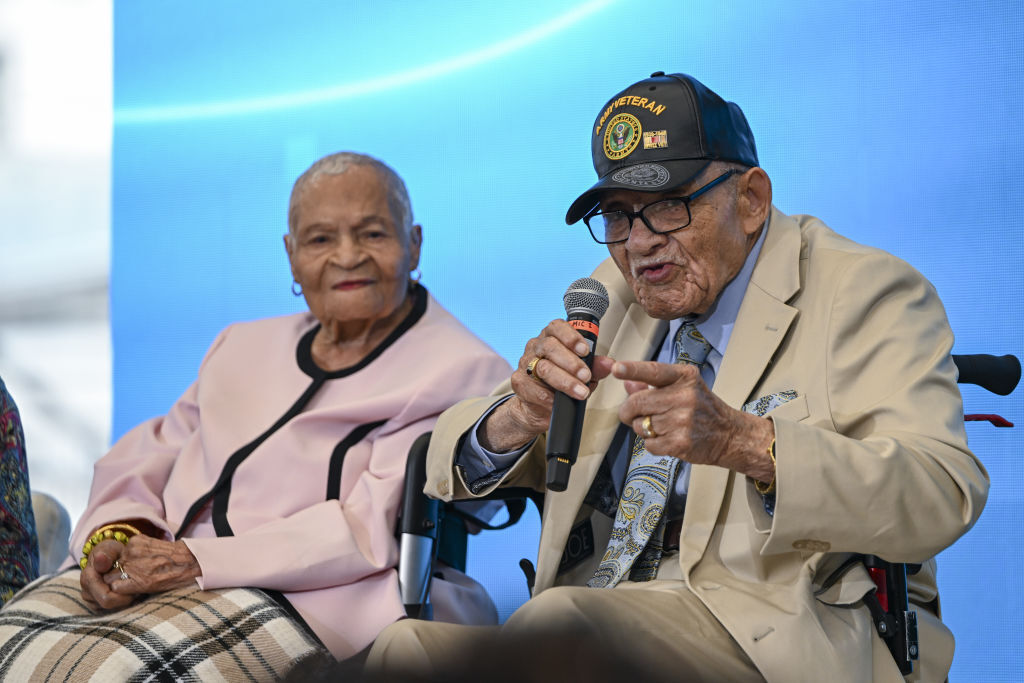
An Oklahoma judge has dismissed a lawsuit seeking reparations. The last three known survivors of the 1921 Tulsa Race Massacre filed the suit.
Viola Fletcher, 109, Lessie Benningfield Randle, 108, and Hughes Van Ellis, 102, filed against the City of Tulsa and other entities in 2020–nearly 100 years after the infamous race attacks, which left dozens dead.
Supporting Group For Last Three Tulsa Riot Survivors Plan To Appeal Judge’s Dismissal
The suit had asked the city to construct a hospital in north Tulsa and create a victims’ compensation fund, amongst other requests, according to the Associated Press.
Seven defendants were named in the lawsuit, including the city of Tulsa, Tulsa County Sheriff Vic Regalado, as well as the Oklahoma Military Department, Fox News reports.
On Friday, Tulsa County District Court Judge Caroline Wall tossed the case with prejudice. Dismissal with prejudice means the plaintiff cannot refile the same claim again in that court, per Cornell Law.
When asked by the AP on Sunday, an attorney for the three survivors did not say whether they plan to challenge Judge Wall’s decision. However, a group supporting the lawsuit–Justice for Greenwood–claims they will likely refile/appeal.
“Judge Wall effectively condemned the three living Tulsa Race Massacre Survivors to languish — genuinely to death — on Oklahoma’s appellate docket,” the group said in a statement. “There is no semblance of justice or access to justice here.”
RELATED: The Tulsa Race Massacre Took Place Nearly A Century Ago Today As Global Demonstrations Protesting Police Violence Are Happening
Judge Wall has described herself as a “Constitutional Conservative.” Wall claims she dismissed the suit based on arguments from the city and regional chamber of commerce.
Since we're talking about the Tulsa Race Massacre todayhttps://t.co/muAX0DiaaC
— Allison Wiltz Psy.M. (@queenie4rmnola) July 7, 2023
Lawsuit Claimed Ongoing Negative Influence From 1921 Tulsa Riots, City, Judge Disagreed
The lawsuit had been filed under the state’s nuisance law. It claimed the actions of the 1921 Tulsa riots continue to affect Black Oklahomans today negatively.
The suit argued that the victims were never compensated–by insurance companies or the city–for the massive financial and economic losses the city’s Black community incurred due to the riots.
A lawyer for the city’s Chamber of Commerce previously called the massacre horrible. However, he added that any nuisance it caused was not ongoing. Judge Wall ultimately sided with the city’s argument against any constant nuisance.
Meanwhile, according to Fox News, Tulsa Mayor G.T. Bynum says that while the city has yet to receive the entire court order, “the city remains committed” to investing in the Greenwood district and educating future generations.
“The city remains committed to finding the graves of 1921 Tulsa Race Massacre victims, fostering economic investment in the Greenwood District, educating future generations about the worst event in our community’s history, and building a city where every person has an equal opportunity for a great life,” Mayor Bynum said.
These beautiful souls are Hughes Van Ellis, 102, Lessie Benningfield Randle, 108, and Viola Fletcher, who just turned 109. They are the oldest living survivors of the Tulsa Race Massacre. They have received $0 reparations.
And now Judge Caroline Wall has dismissed their case.🤔 pic.twitter.com/3W2n6bi3UQ
— Qasim Rashid, Esq. (@QasimRashid) July 8, 2023
The 1921 Tulsa Race Riot Massacre: A Brief History Of A Devastating Act Of Domestic Terrorism
The massacre reportedly started after a Black man was accused of sexually assaulting a white woman, Fox News reports. He was arrested and jailed at the Tulsa County Courthouse.
A group of armed Black men eventually surrounded the courthouse to defend him out of fear the man would be lynched. His charges were later dropped.
Between May 31, 1921, and June 1, 1921, a mob of angry white people stormed the neighborhood of Greenwood in response. At the time, the district was one of the wealthiest Black communities in the United States.
Attackers burned and destroyed more than 35 square blocks of the neighborhood. Over 1,000 homes and properties were destroyed in the massacre. The area was colloquially known as “Black Wall Street,” according to CNBC.
The Tulsa Race Massacre: Remembering a Dark Chapter in American History
The Tulsa Race Massacre, also known as the Tulsa Race Riot, stands as one of the most devastating incidents of racial violence in American history. Occurring in the Greenwood District of Tulsa, Oklahoma, in… pic.twitter.com/ahfesPpIxX
— Joseph Bonner (@mrjosephbonner) July 7, 2023
A 2001 Tulsa Reparations Coalition investigation identified 39 dead, 26 black and 13 white. That information was based on autopsy reports and death certificates, the outlet reports.
However, current estimates put the number into the hundreds, Tulsa History reports.
Roughly 800 were hospitalized, and thousands were left homeless following the massacre. It’s considered one of the worst cases of domestic terrorism in the country’s history.
Meanwhile, last week, Viola Fletcher–the oldest living Tulsa riot survivor–released a memoir about her life before, during, and after the massacre and the effect it has had on her very long life. It will be widely available next month.
















